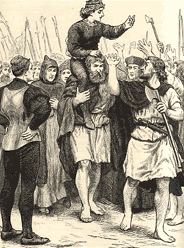John Estrete
John Estrete, or Strete (died c.1491) was an Irish judge and statesman of the late fifteenth century. He held the offices of King's Serjeant, Deputy Chief Baron of the Irish Exchequer, Master of the Coinage of Ireland and member of the Privy Council of Ireland.[1] He was a supporter of Gerald FitzGerald, 8th Earl of Kildare but also gained the confidence of the English Crown, and acted as intermediary between the Crown and Kildare, notably during the rebellion of Lambert Simnel.[2]
Family
The Estrete or Strete family were prosperous citizens in fifteenth-century Dublin, who later acquired lands in Louth and Meath. The name is thought to be an early form of Street. John was the son of John Estrete senior and his wife Joanna Estrete. He was married and had four sons and two daughters, but by 1488 only two of his children, George and Katherine, were still alive.[3]
Career
He is known to have been practicing in the courts of common law by 1477.[4] In 1478 he went to England, received a royal pardon for an unspecified offence, and was appointed King's Sergeant.[5] He probably owed this appointment to the influence of the 8th, or "Great" Earl of Kildare, who was then beginning his long dominance of Irish politics.
Law school
As King's Serjeant he was notable for running an elementary law school, at a time when members of the Irish bar were required to obtain their education at the Inns of Court in London. Sir William Darcy, the Vice-Treasurer of Ireland, recalled in later life that in 1482–83 he and other law students had spent the law terms at Estrete's house in Dublin, studying those texts a knowledge of which were necessary for law students who intended to qualify at the Bar, and would prepare them to proceed to the Inns of Court.[6]
Under Richard III
Estrete remained in office as Serjeant when Edward IV was succeeded by his brother Richard III. The King was unwilling to confirm Estrete's patron, the Earl of Kildare, as Lord Deputy of Ireland, and Kildare sent Estrete to England to plead his case to be retained as Deputy for ten years, with a salary of £1000 a year and certain grants of land. Richard would do nothing until Kildare came to see him personally, and the Earl reluctantly complied.[7] This episode probably established Estrete's role as an intermediary between Kildare and the English Crown.

Richard III
Lambert Simnel

After Richard's downfall at the Battle of Bosworth, the new King Henry VII confirmed Estrete in office as Serjeant. He was in London in 1486 and had a personal audience with the King.
When the Yorkist pretender Lambert Simnel appeared in Ireland Kildare was his strongest supporter, and encouraged him to invade England and seize the throne. The King sent Estrete to Dublin to invite Kildare to England to discuss his position; it appears that Henry was prepared to grant roughly the same terms which Kildare had demanded from Richard III.[8] Kildare did not respond to the offer, and Simnel with an army raised by Kildare invaded England, only to see his cause crushed at the Battle of Stoke.
Later years
While Simnel's suppoters, including Kildare and his powerful father-in-law Rowland FitzEustace, 1st Baron Portlester, were forced to sue for a royal pardon for their acts of treason, Estrete seems to have been regarded as a reliable King's man, being described as "the King's servant and counsellor".[9] He was appointed Master of the Irish Coinage and a Privy Councillor: Chrimes states that he was appointed to the Privy Council of Ireland,[10] but other historians believe that as a mark of special favour he was made an English councillor.[11] Certainly the King, who was not as a rule overly generous even to his supporters, in 1489 called him "a man worthy of reward".[12] His highest office in Ireland was Deputy Chief Baron: Lord Portlester had used his influence to obtain the office of Chief Baron for his son Oliver FitzEustace, who was mentally deficient, with the right to appoint his deputy.[13] Estrete held office from 1487 until 1491, when he probably died.
Christ Church Cathedral

In 1485 Estrete established a chantry in Christ Church Cathedral, Dublin to pray for the souls of his benefactors, Kildare and Portlester.[14] In 1488 the grant was extended to provide for prayers for the King, and for Estrete's parents, uncles and living and deceased children. Mass was to be said every day in the Chapel of St Laurence O'Toole, with a high mass once a week. After Estrete's own death, mass was to be said for him every year.[15]
References
- ↑ Ball, F. Elrington The Judges in Ireland 1221-1921 John Murray London 1926 Vol.1 p.187
- ↑ Ball p. 107
- ↑ Appendix to Twenty-fourth Report of the Deputy Keeper for Records in Ireland par. 1091
- ↑ Hart, A.R. History of the King's Serjeants at law in Ireland Round Hall Press Dublin 2000 p. 24
- ↑ Ball p. 187
- ↑ Kenny, Colum King's Inns and the KIngdom of Ireland Irish Academic Press Dublin 1992 pp. 21–22
- ↑ Otway-Ruthven, A.J. History of Medieval Ireland Barnes and Noble Reissue 1993 p.401
- ↑ Chrimes, S.B. Henry VII Yale University Press 1999 p.258
- ↑ Hart p.147
- ↑ Chrimes p. 258
- ↑ Hart p. 25
- ↑ Ball p. 187
- ↑ Ball p.107
- ↑ Ball p.107
- ↑ Ball p. 107